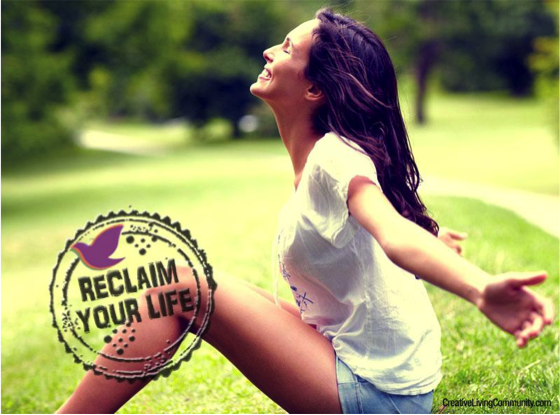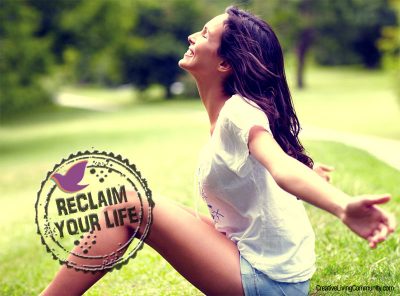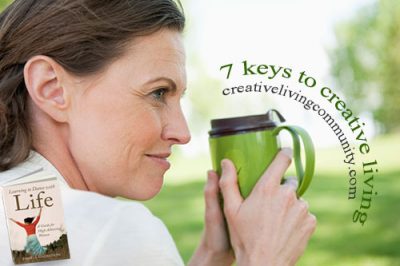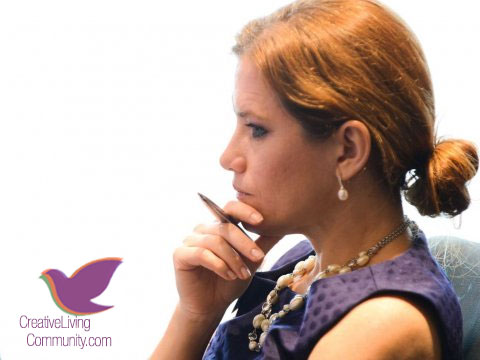
by pam | Jul 27, 2015 | Conscious Living, Creative Living, High Achieving Women, Powerful practices, Proven strategies
 What do I mean by reclaiming your life? Many High Achieving Women give to other people, causes, and their work BEFORE they give to themselves. They put themselves at the “bottom of the list”. If they do take some time out for themselves, they often feel guilty that they are not working, or selfish that they are not giving to others. Sound familiar?
What do I mean by reclaiming your life? Many High Achieving Women give to other people, causes, and their work BEFORE they give to themselves. They put themselves at the “bottom of the list”. If they do take some time out for themselves, they often feel guilty that they are not working, or selfish that they are not giving to others. Sound familiar?
Reclaiming your life means consciously examining your activities (giving to others and to yourself), making a decision as to what changes you want to make, committing to them and then making those changes. Here’s a short exercise.
In what areas of my life am I giving to others, how often and how does it make me feel? Here are a couple of examples. I invite you to create your own table and fill it in.
| Activity |
Environment or Individual/Community |
# of hours/wk/month |
Feeling state* |
| 1) Volunteer Board member |
National Not-for-Profit |
2 hrs/month |
++ |
| 2) Driving my 2 kids to their sports activities |
Local hockey arena(s) & soccer fields |
4 hrs/week |
+ |
| 3) Always being a sounding board for my girlfriend |
On the phone or at her house or mine |
4 hrs/week |
– |
| … |
|
|
|
* ++ (extremely positive; energized & excited) , + (positive) , N (neutral) – (slightly tired, frustrated &/or resentful) or – – (exhausted, extremely frustrated &/or extremely resentful)
Add up the number of hours per week and per month you are giving to others and also notice which activities drain you and which ones really “juice” you.
Next, answer the question: In what areas of my life am I giving to myself, how often and how does it make me feel?
| Activity |
Environment or Individual/Community |
# of hours/wk/month |
Feeling state* |
| 1) Yoga classes |
Local studio |
4.5 hrs/week |
++ |
| 2) Having a massage |
Therapist comes to my home with her table |
1.5 hrs/month |
++ |
| 3) Having lunch with a friend |
Local restaurant |
Once/wk x 1.5 hrs. |
++ |
| … |
|
|
|
* ++ (extremely energized &/or supported), + (energized &/or supported) N (neutral)
Add up the number of hours per week and per month you are giving to yourself and note which activities really “juice” and/or support you and any that don’t.
Compare the difference between the two tables. Do have any insights?
I invite you to make a conscious decision to let go of one or several GIVING behaviours that are draining you. Decide on the best strategy for letting go of, or delegating those activities, and set a date to do so.
Now review your second chart. Note the activities that are really energizing and/or supporting you. Do you want to increase the number of hours per week you do those OR are there some other things you’d love to try (e.g. taking piano lessons). Add those to the list and set a date to begin them.
Notice how you feel when you “let go” of some of the GIVING activities that have been draining you and when you add more activities where you give to yourself. I invite you to journal about your experience.
Sometimes we go through life and think that we don’t have choices. In fact, we always DO.
When you reclaim your life, you serve as a role model for other women in your family, community, workplace…; so while doing something for yourself, you are also making a positive difference in the lives of other women.
Did you have any new insights from the exercise? Have you committed to making any changes? I’d love to hear from you. Feel free to share the post with others.

by pam | Jul 13, 2015 | Creative Living, Entrepreneurship, High Achieving Women, Powerful practices, Proven strategies
 Creative Living is the conscious cultivation of improved health, happiness, fulfillment, and inner peace in your life.
Creative Living is the conscious cultivation of improved health, happiness, fulfillment, and inner peace in your life.
Based on my own journey and work with clients around the world, I have distilled 7 keys to what I call Creative Living. By integrating the 7 keys and their associated proven practices and powerful strategies into your life, you will learn to thrive in life and in business/work. In other words, you will learn to dance with life.
The 7 keys are:
- Listen to and trust in your body’s wisdom
- Tap into and express your creative side
- Consciously create right and left brain/body balance
- Live life in alignment with your core values
- Believe that you are here to make a difference
- Learn from and embrace life transitions
- Find inner peace, and build peace in your family, friends, community, workplace… the world.
A chapter is devoted to each one of the 7 keys in my book Learning to Dance with Life: A Guide for High Achieving Women.
The value of growing your practice of the seven keys is supported by evidence from neuroscience, the arts, and Eastern psychology. I’ve learned from personal experience and from working with clients that integrating the seven keys to Creative Living into your life will support you as you learn to dance with life.
Are you interested in learning to dance with life or are you currently dancing with life? I’d love to hear your comments. Feel free to post them below and to share this with others.

by pam | Jul 1, 2015 | Beliefs & Values, Creative Living, Life Purpose, Powerful practices, Proven strategies
 What is the one thing that makes you leap out of bed in the morning?
What is the one thing that makes you leap out of bed in the morning?
What is your reason for being?
What is that dream or vision that serves as a guidepost for you to focus on when there is chaos and life gets rough?
That’s your BIG WHY! Some people call it your life purpose. Your life purpose “touches your heart” and “gets you excited.”[1] As Marcia Weider, author of Making Your Dreams Come True says: “The broader you state your purpose the better, because the broader your purpose the more room there is for passion and possibility. “
Here are a few examples of life purposes:
- To live life as an adventure and make a positive difference in the world
- To inspire and support others to live their best lives ever
- To learn and contribute to making the world a better place.
Mine, is to build peace in the world one woman at a time; because when I help a woman find inner peace, she can then build it in her family, community, workplace and… the world. It’s a huge life purpose and a bit scary, yet it inspires me every day and helps me focus when I feel I’m going into overwhelm.
How do you find your BIG WHY? A good place to start is to identify your passions. These are the things that light you up, make your soul sing and when you do them you lose track of time. It could be film editing, teaching and/or mentoring others; it could be painting or dancing to name a few. In a previous post, I shared some proven practices for identifying your top 3 to 5 passions – http://creativelivingcommunity.com/are-you-passionate-about-your-work/. I encourage you do the exercises in that post if you haven’t already.
After doing those exercises or if you know your top 3 to 5 passions, take a few minutes to draft a life purpose statement using the stem: My life purpose is to: …
Realize this is just the beginning and you will likely need to return to and reflect on what you’ve written and decide if it really truly is YOUR life purpose. A couple of helpful questions to ask related to your life purpose are: How do I want to be remembered? What am I most passionate about?
Getting in touch with your life’s purpose and drafting one that “feels good to you” will inspire you to move forward and make the changes necessary to create the life and work of your dreams. Have fun!
I’d love to hear from you. Share your comments and insights below. Feel free to share the post with others.
[1] Weider, M. Making Your Dreams Come True. New York: Harmony Books, 1999.


by pam | Jun 15, 2015 | Creative Living, High Achieving Women, Powerful practices, Proven strategies, Work/Life Balance

What’s all this talk about Work/Life Balance and why is it so important?
I particularly like the metaphor Austin Vickers shares in his book Stepping Up To a Life of Vision, Passion and Authentic Power (2005). He likens balance to a three-legged stool. Vickers refers to the three stool legs as “body, mind and spirit” and notes “all three of these legs of life are necessary to make us stable and balanced.” He cautions that if you are missing one leg of your stool “all of your energy is spent trying to maintain balance and not fall over. You cannot relax. But upon a balanced stool, one can relax, read, work or use it as a tool to do other things.”
The cultures of China and India have recognized the importance of a balanced life for more than 2,000 years. Their theories of health and illness are based on the presence (or not) of balance. Traditional Chinese Medicine (TCM) is based on the belief that dis-ease is caused by energy blockage in the body. In order to stay healthy, it is important to keep energy moving throughout our bodies; for example, by regularly practicing yoga, qigong or tai chi, having therapeutic massages by an experienced practitioner, or receiving balancing from an energy healer.
Data show that balance is important for performance and for creativity. We need space and inner calm to create. If we constantly feel like we’re on a treadmill and unable to get off, it eventually affects our performance as we have difficulty sleeping, are challenged to focus, and we have no time and space to “recharge our batteries”.
Lissa Rankin in her book Mind Over Medicine (2013) cites a number of studies showing that chronic stimulation of the body’s stress response caused by work-related stress can lead to autoimmune disease (such as fibromyalgia), heart disease, cancer, inflammatory disease, chronic fatigue syndrome, diabetes and other illnesses. International data also show that overwork leads to early death. The Japanese actually have a name for it – karoshi, or “death by overwork”.
Work/Life Balance is an elusive and personal concept. Elusive, because so many people talk about and strive for it, yet few are able to attain and/or maintain it. Personal, because what work/life balance looks and feels like for you is different from what work/life balance looks and feels like for me.
Imagine what your life would be like if you were able to quiet your busy mind, forget about your “to do” list when “off “ work, have time for family and friends without feeling guilty; and feel good at the end of the day based on what you’d accomplished?
Here are a couple of exercises to help you explore work/life balance.
- When you think about work/life balance what thoughts and feelings come up for you? Take a few moments to jot these down.
Take a few moments to relax. Take several deep breaths and get comfortable. Then think about your personal vision of work/life balance. Answer the following question.
- What does work/life balance look and feel like for you? You may find it helpful to use the stems I see…and I feel…. For example: I see time in my schedule to have lunch with good friends regularly. I see doing yoga classes four times per week and really being present during these classes. I feel inner calm. I feel there is enough time to do what I want to do each day.
I’d love to hear from you and welcome your comments and insights below. Please share with others who you think might benefit.
P.S. My book “Learning to Dance with Life …” includes an entire chapter of proven strategies and powerful practices for creating more balance in your life.

by pam | Jun 1, 2015 | Conscious Living, Creative Living, Discovering Your Passion, High Achieving Women, Powerful practices, Proven strategies

Do you remember when you used to wake up excited about going to work?
Do you NOW usually drag yourself out of bed, rather than hitting the ground running?
Are you no longer “juiced” by what you do?
Do you feel SOoo tired at the end of the day?
If so, you are not alone. I’ve been there and so have many of my clients. When we drive ourselves for extended periods of time, we often lose our passion. That’s why I created the Rediscover Your Passion and Find the Career/Business of Your Dreams coaching program.
We all have unique gifts and talents to share with the world. Yet sometimes we lose touch with them or never have been given the opportunity or taken the time to reflect on what truly makes our soul sing. Here’s a short exercise to get started.
Draw a chart with 2 columns; in the one column Write down all the things that you are good at or things that come easily and naturally to you. It could be athletics, mathematics, writing … In the second column, write down things you enjoy doing. Could be “being in nature”; teaching others; using my body; playing piano … If you’re having a challenge with this, think back to what you enjoyed doing as a child.
Now look at both lists and circle the items that are similar, or are on both lists. Then review the circled items. Close your eyes, go inside and get in touch with the feeling each one evokes inside you. Does it excite you? OR Does it have little or no effect on you? Rate each item on a scale from 1 to 10 related to the level of passion you have around it – 1 being – “no interest at all” and 10 being – “red hot”. From this exercise, identify your top 3 to 5 passions. They may be: writing; contributing to a cause greater than myself; editing film.
Just because we’re good at something, doesn’t mean it is our passion or will fulfill us when we work in that area. I’m sure you know someone who was good at math, went on to study mathematics, taught it at school or university and over time was miserable and not at all happy teaching math everyday. So what we’re good at can provide clues to our passions but are not necessarily connected with them. Things we enjoy doing are normally better clues to what may be our passions. Passions are often a blend of what you love and what you’re good at. As well, passions may change throughout our lives.
To further explore your passions, here are some more questions to reflect and journal on.
- What would I like to do if I had all the time and money in the world?
- What are my hobbies?
- What is one thing I did as a child that I really enjoyed?
- When have I/do I get lost in what I’m doing (i.e. lose track of time)?
Did you discover anything new? I’d love to hear your comments and insights. Feel free to share the post with others.

by pam | May 19, 2015 | Beliefs & Values, Body-centered coaching, Conscious Living, Creative Living, Powerful practices, Proven strategies

When you have an important decision to make, how do you usually approach it? If you’re anything like me, I used to do the pros and cons list and make a logical left-brain decision. Some years ago, I began reflecting on my life and realized that the decisions I’ve made from my heart or my gut have always been the right ones for me, resulting in positive life experiences. When the decisions came solely from my head and my logical left-brain (using a pros and cons list), the results were not so good.
During the past 15 years or so I have become consciously aware of how important it is to listen to my body, how to do it and how to trust in the messages it sends me.
Did you know that our gut and our heart have nerve endings that send signals to our brains? So when we say that our gut or heart is telling us something, there is scientific evidence this is so
How can you access, listen to and trust in your body’s wisdom and the messages it sends you? Here’s a process I use and teach my clients.
Think about a decision you would like assistance in making. Get comfortable, close your eyes, take several deep breaths in through your nose and out through your mouth. Then continue to breathe normally in and out through your nose. Feel your feet and imagine deep roots coming out of the bottom of them and reaching deep down into Mother Earth. Then imagine branches growing from your shoulders and head that reach up to the sky and tap into the beautiful Source Energy/God/Universal Energy (whatever you choose to call it). Feel that light coming in through the top of your head and bathing your entire body. Now that you are grounded and connected with earth and sky/heavens, ask the question that you would like clarity on. It could be, Should I apply for that new position? Should I start my own business? Continue to breathe deeply and notice if any answers come up for you.
Some people experience a sense of knowing, others receive an auditory message, still others see a vision of someone speaking to them, or an object that is a metaphor or a sign of what is in their best interest or for the highest good.
This takes time and practice. Be patient with yourself and learn to trust the process and your body’s wisdom. You may find it easier to start with smaller decisions that don’t involve much change in your life: Should I call up my friend today? Often when you follow your heart or gut and call up a friend, they will say to you, “We must have ESP!” or, “I was just thinking of you and about to give you a call.” It’s like a muscle: the more you use your body’s wisdom, the easier it will become and in time you will make decisions that you trust are the right ones for you.
Some people find that initially no answer comes to them. If you find that to be the case, don’t beat yourself up. Rather, ask throughout the day for a sign that provides you with the answer. Let go and get on with your day and notice that at some time when you’re not thinking about it, the answer may come to you and you will know what action to take.
Another suggestion is to ask a question just before you go to sleep and also ask that you receive the answer on awakening. It’s helpful to keep a pen and paper by your bed in case things come to you during the night or on awakening. *
I invite you to experiment with the process above. I’d love to hear your experiences and welcome your comments below. Feel free to share the process with others.
* Part of this post is an excerpt from my book Learning to Dance with Life: A Guide for High Achieving Women. Stay tuned for the launch date!

 What do I mean by reclaiming your life? Many High Achieving Women give to other people, causes, and their work BEFORE they give to themselves. They put themselves at the “bottom of the list”. If they do take some time out for themselves, they often feel guilty that they are not working, or selfish that they are not giving to others. Sound familiar?
What do I mean by reclaiming your life? Many High Achieving Women give to other people, causes, and their work BEFORE they give to themselves. They put themselves at the “bottom of the list”. If they do take some time out for themselves, they often feel guilty that they are not working, or selfish that they are not giving to others. Sound familiar?







